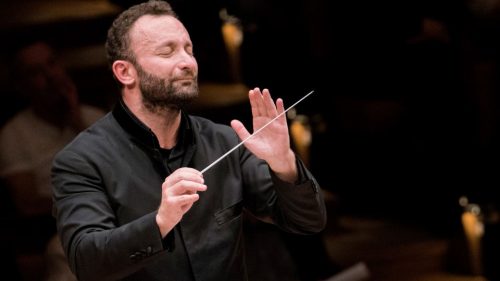 Germany Shostakovich: Berlin Philharmonic Orchestra / Kirill Petrenko (conductor). 14.11.2020 performance from the Philharmonie Berlin and viewed as a livestream on the Berlin Philharmonic’s Digital Concert Hall. (GT)
Germany Shostakovich: Berlin Philharmonic Orchestra / Kirill Petrenko (conductor). 14.11.2020 performance from the Philharmonie Berlin and viewed as a livestream on the Berlin Philharmonic’s Digital Concert Hall. (GT)

Shostakovich – Symphony No.8 in C minor, Op.65
In this difficult season, the Berlin Philharmonic Orchestra have been attempting to maintain their core programme of concerts albeit with restricted audiences. This season – the second under the new Chief Conductor Kirill Petrenko – the orchestra is programming all the major symphonies by Shostakovich. For Petrenko ‘this music is relevant at this time in history, because it raises questions of war, tyranny, repression and disease, and that working on this symphony can help us find the answers to the problems of the world today.’ He said that this symphony has similarities with Mahler, but also with ‘Bruckner in its epic breadth and that its huge arc offers intense personal feelings and emotions.’ Certainly, the Russian-born conductor’s debut concert here – on the basis of which the orchestra members decided to offer him the chief conductorship – was Stravinsky’s Symphony of Psalms and they were impressed not only by his performance but also by his explanation of the music and rehearsal methodology.
Petrenko has proved an outstanding interpreter of a wide-ranging repertoire. In this season already he has shown he has a particularly fine understanding of Shostakovich’s Ninth Symphony, not only proving the orchestral magnificence of the music but bringing out all the irony and wit and indeed the subtext in the score. Petrenko said that when he lived in the Soviet Union the Eighth was rarely played. In the West, Shostakovich’s Eighth Symphony is not often heard in the concert hall; the technical difficulty and the huge forces required together with a highly skilled conductor are not often available. I cannot recall the Berlin Philharmonic playing this symphony before, and indeed under Sir Simon Rattle, the orchestra usually invited guest conductors like Paavo Järvi, Bernard Haitink, or Thomas Sanderling to undertake Shostakovich symphonies here, but never the Eighth.
Regrettably, owing to new regulations in Germany, no audience was present, however a darkened hall created a subdued mood particularly against the backdrop of this music. The huge orchestra was seated with violins on the left, the violas, and double-basses on the right, while the cellos were in the centre, and the wind and percussion sections were spaced out at the back of the hall. It was clear from the opening motif – fortissimo in octaves – and the great lyrical theme on the strings that Petrenko has the handle of this great symphony. I was particularly impressed by how the violas led by Naoko Shimuzu brought a deeply sombre mood to the Adagio – and in the playing here – surely this orchestra have the finest virtuoso strings in Europe. The dramatic switch to the dissonance of the Allegro section was finely executed. There was some particularly superb playing from the cor anglais of Dominik Wollenweber in the return of the secondary theme before this huge movement closed. The second movement Allegretto is more akin to a scherzo and was brilliantly performed by all groups of the orchestra. It was noticeable in Petrenko’s thoughtful and demonstrative conducting how all the emotions of the music were reflected in his facial expression. The evocation of the work’s tragedy was conveyed by majestic breath-taking chords portraying terror and despair from the brass against the chillingly persuasive playing from the massive string sections.
The third movement, Allegretto, for me, has always portrayed the horrors of war with the dramatic toccata of brass and percussion seemingly evoking T34 tanks storming the Nazi battle lines. The solo trumpet playing by Guillaume Jehl was superlative in the stormy climax – like a clarion call in the storm of war. The quality of the playing from the strings was again out of this world, clearly Petrenko has inculcated in his musicians how to play Shostakovich. From the stormy battle-like music, the opening of the fourth movement Largo, more like a Passacaglia – surely one of the finest movements written by Shostakovich – was spellbinding. From the battlefield to the scene of the dead victims of the slaughter – it is a rather hauntingly reflective segment finely drawn by Petrenko. The bassoon of Stefan Schweigert eloquently introduced the final Allegretto in a plaintive tone as if calling for peace against the past conflict. This theme was picked up by the strings, horns, woodwind, and percussion, with notable solos from Noah Bendix-Balgey on violin, Manfred Preis on bass clarinet, and finally the flute of Mathieu Dufour brought this great symphony to a close against hushed strings. As the composer wrote, ‘All that is dark and evil disappears, and beauty triumphs.’
This was a truly magnificent performance of one of the twentieth-century’s great symphonies and one looks forward to the remaining concerts of the Shostakovich symphonies here with great anticipation. This performance will be available on the Digital Concert Hall (click here) for subscribers and readers may be interested in a discount for new subscribers in January 2021.
Gregor Tassie
